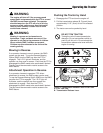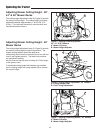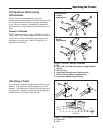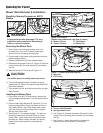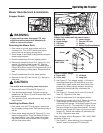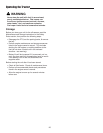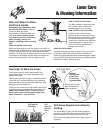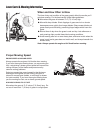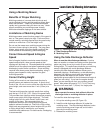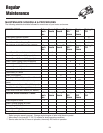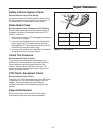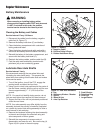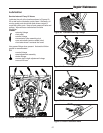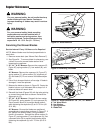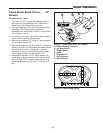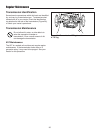
23
Lawn Care & Mowing Information
Using a Mulching Mower
Benefits of Proper Mulching
Mulching consists of a mower deck which cuts and
recuts clippings into tiny particles and then blows them
down into the lawn. These tiny particles decompose
rapidly into by-products that your lawn can use. Under
proper conditions your mulching mower virtually
eliminate noticeable clippings on the lawn surface.
Limitations of Mulching Decks
Mulching mowers cannot function properly if the grass is
wet, or if the grass is simply too high. Even more than
normal mowing, mulching requires that the grass be dry
and that no more than 1/3 of the height is cut.
Do not use the mower as a mulching mower during the
first two or three cuttings in the spring. The long grass
blades, quick growth, and often wetter conditions are
more suitable for broadcasting (side-discharging).
Correct Ground Speed & Engine
Speed
Use full engine throttle to maximize mower blade tip
speed matched with a slow ground speed so that
clippings will be finely cut. Ground speed while mulching
should be half the speed used when broadcasting (side-
discharging) under similar conditions. Since mulching
requires more horse power than broadcasting, using a
proper ground speed is vitally important for good
mulching operation.
Correct Cutting Height
Cutting off too much at one time shocks the plant’s
growth system and weakens the grass. A good rule of
thumb is the 1/3 rule: to cut no more than one third of the
grass height, and never more than 1 inch (2,5cm) at a
time.
The best mulching action typically results from cutting
only the top 1/2” to 3/4” (1,25 - 2cm) of the grass blade.
This provides short clippings which decompose properly
(much more quickly than longer clippings). The ideal
cutting height will vary with climate, time of year, and
quality of your lawn. We recommend that you
experiment with both the cutting height and ground
speed to achieve the best cut. Start with a high cutting
height and use progressively lower heights until you find
a cutting height that is matched to your mowing
conditions and preferences. For best results, overlapping
is recommended.
Using the Side Discharge Deflector
When to use the side discharge deflector: If you’ve
been on vacation or missed a mowing and the grass has
gotten very long, do not try to mulch at your normal
cutting height. To handle these situations your mulching
mower is equipped with a side discharge deflector.
Installing the side discharge deflector allows you to
broadcast clippings. Broadcasting, or side-discharging,
disperses fine clippings evenly over the entire lawn.
Always operate the engine at full throttle. Use an
appropriate ground speed for the thickness and height of
grass you are cutting. If you hear the engine slowing
down, you are mowing too fast, use a slower ground
speed. Mow when the grass is 3”-5” (7,6-12,7cm) long.
Do not cut off more than 1” (2,5cm) in a single pass.
To install the side discharge chute:
1. Lift up the mulching cover (B, Figure 15).
2. Install the side discharge deflector (A) under the
mulching cover. The side discharge deflector hooks
onto the mulching cover hinge rod, and is held in
place by the mulching cover.
3. Release the mulching cover.
Figure 15. Installing the Side Discharge Deflector
A. Side Discharge Deflector
B. Mulching Cover
WARNING
Never operate the mower deck without either the
discharge chute or mulching deflector in place.
A
B



